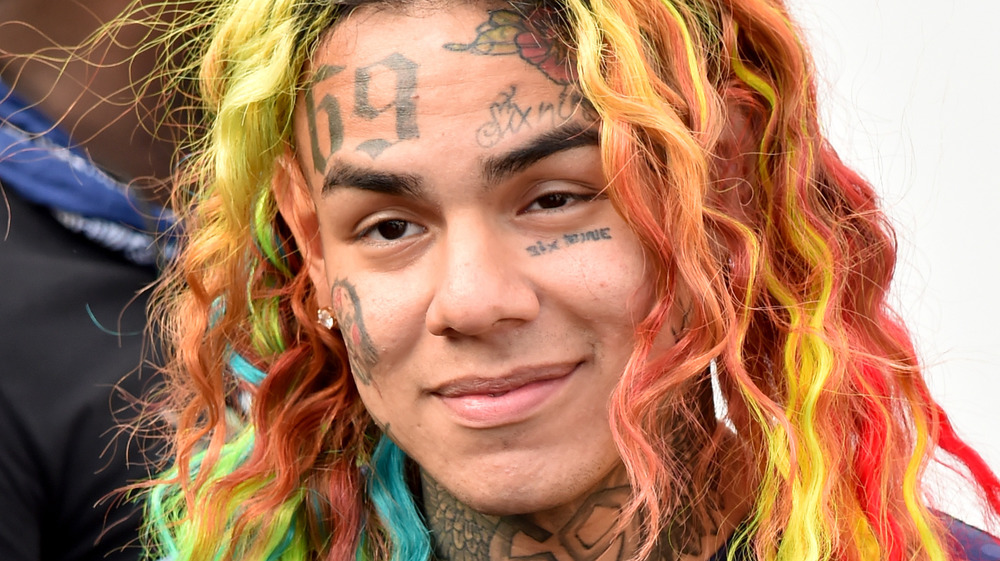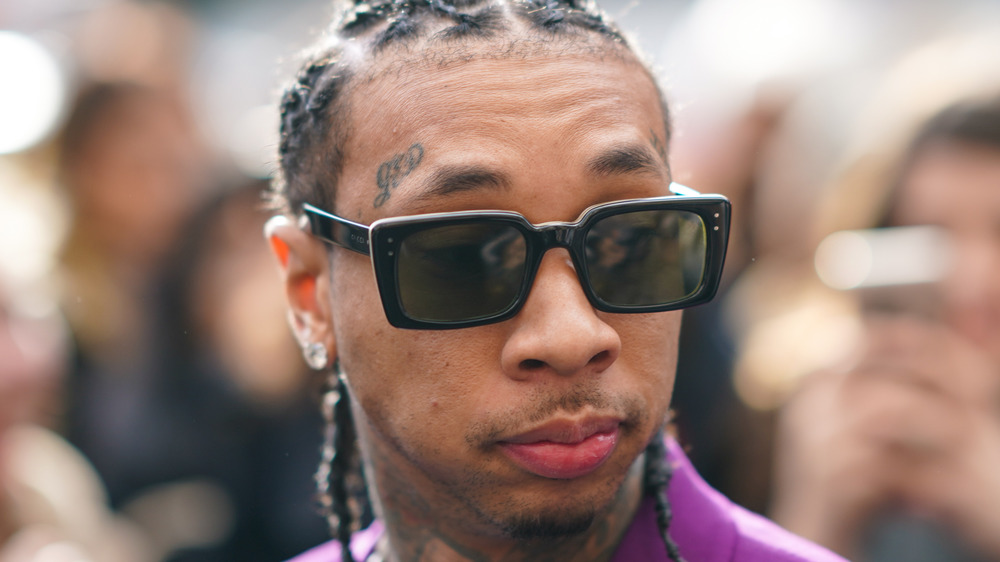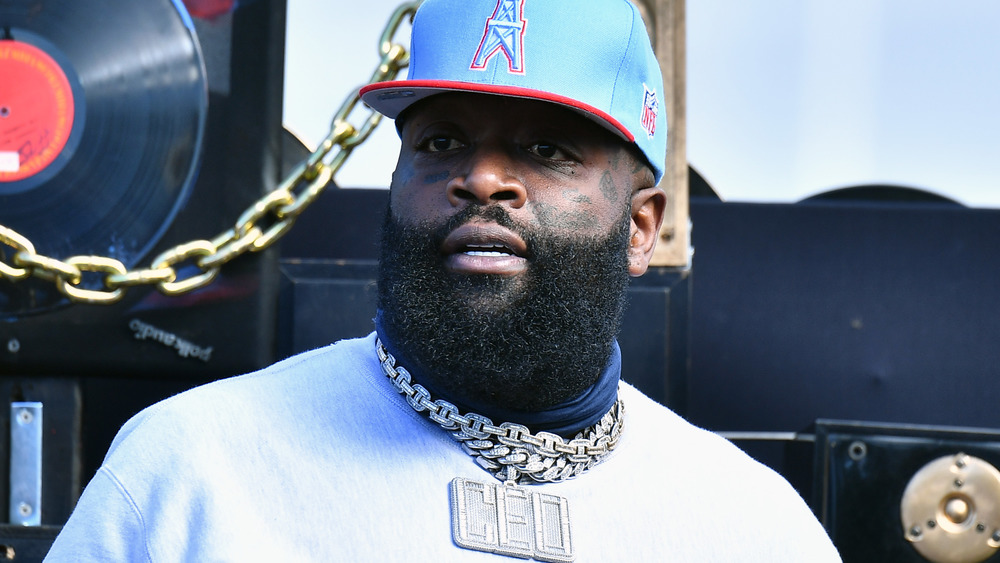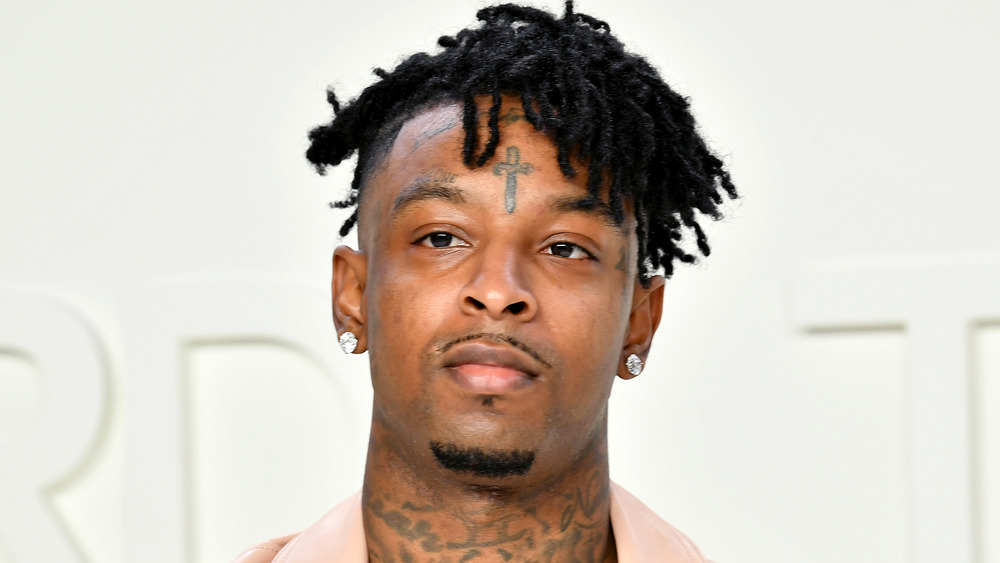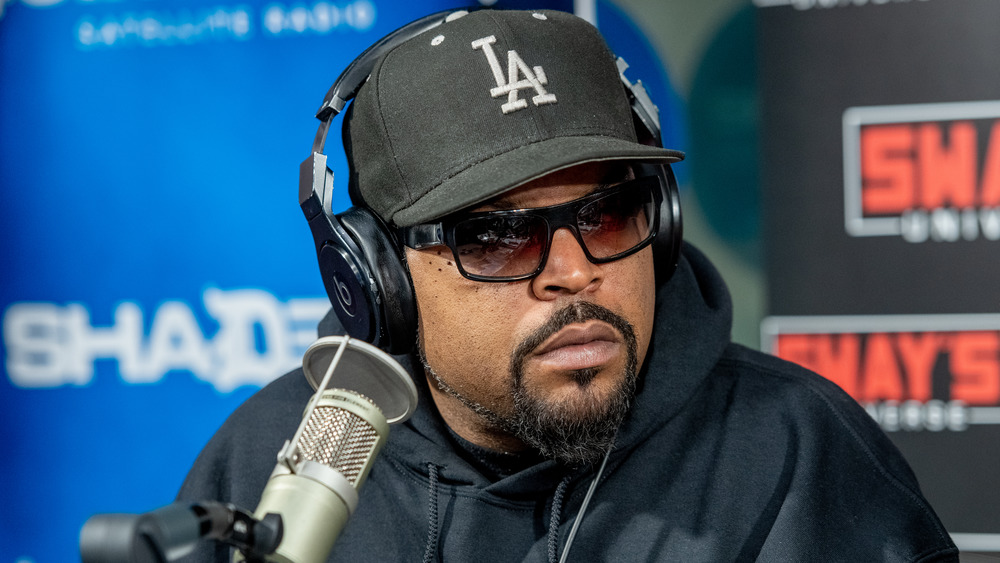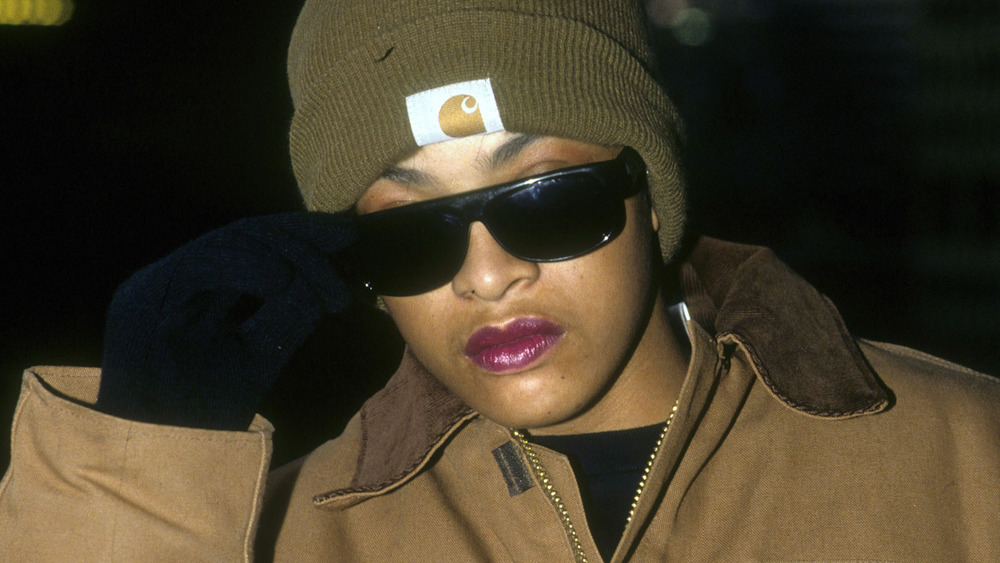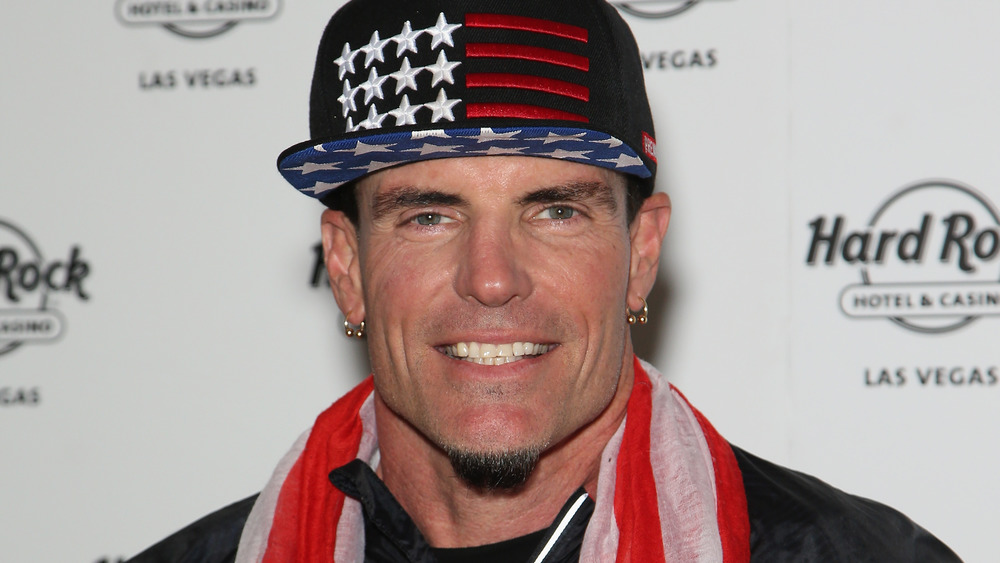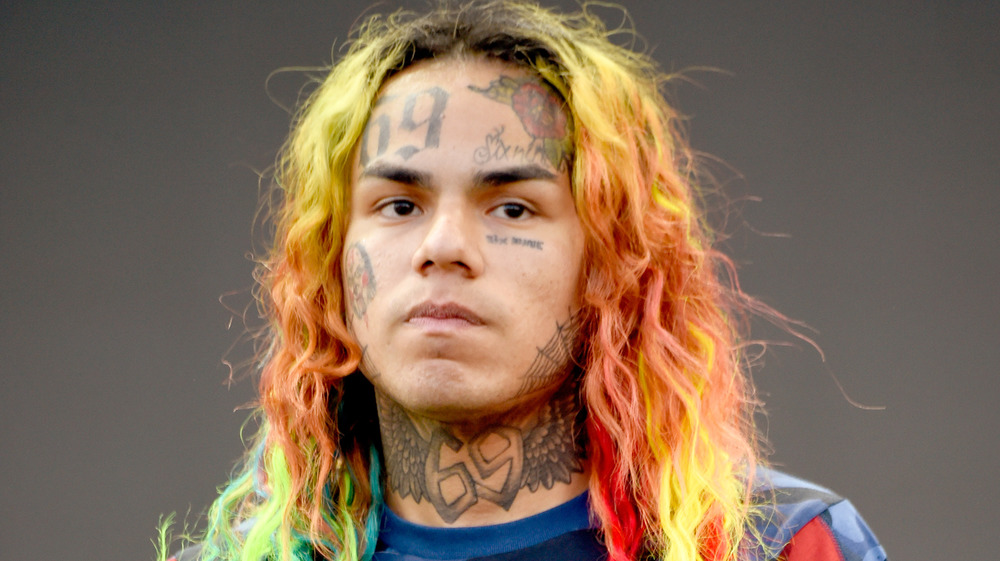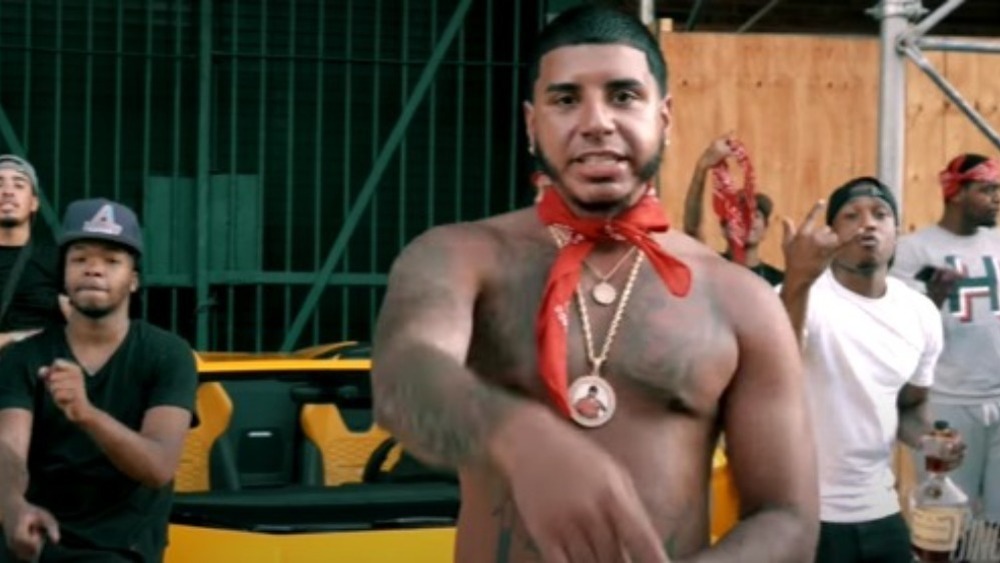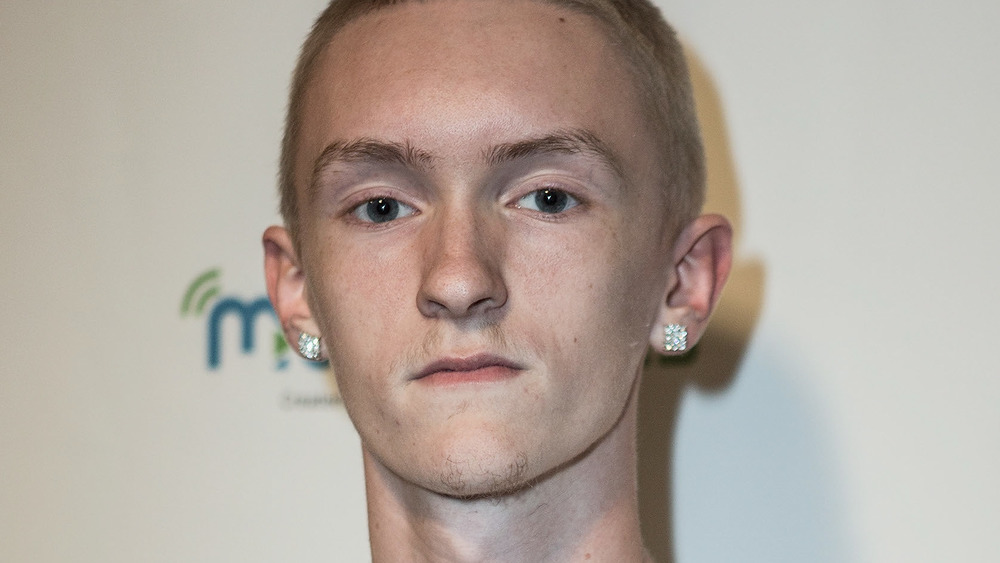Rappers Who Were Accused Of Faking Their Tough, Street Image
Oftentimes, there's a lot of space between an entertainer's public persona and who they are behind closed doors, which makes sense because it seems that many like their entertainers bigger than life. And let's face it, most probably don't want to envision their favorite rock star, let's say, walking around in his boxers and socks at home before plopping down on the couch and belching the night away.
But sometimes celebrities get heavily criticized for creating their image—a thing that happens in rap music a lot. Some rappers admitted to lying about their past because they were embarrassed to present their real selves and true origin. There are others who were caught hiding their true upbringing continued to deny it, even though the evidence against them was all over the place.
So who are some of the rappers who've charged with contriving their image? Before we get to the list, it's important to note that we aren't saying all of these rappers lied about their past or committed a type of fraud, but they have been accused by others of doing so. On that note, let's go.
Tyga
The title of Tyga's first album is No Introduction, but after it was released he still needed to introduce himself and explain just how he grew up. That's because, in December of 2013, old footage leaked of a show called Bustas that showed a teenage Tyga talking about living in Los Angeles' San Fernando Valley. "Grew up not too tough, parents had a Range Rover, doing it big, not too much hard, but I'm still street," said Tyga on Bustas (via TMZ). This snippet raised some questions, as Tyga has always said he was from Compton, the West Coast city made famous by people like Dr. Dre and N.W.A.
After the clip surfaced, the "Rack City" rapper set the record straight during an appearance on Big Boy's Neighborhood on Los Angeles radio station Power 106. "The intro beginning was scripted. I never grew up in the Valley. I lived in Compton/Gardena my whole life ... I'm young, I'm ambitious, I don't care, I'm getting a check for this, I'm having fun, I'm about to be on T.V.," he said. The controversy pretty much died down after he explained himself, and the California native went on to have a pretty fruitful career afterward.
Rick Ross
When Rick Ross shot to fame because of his 2006 hit "Hustlin,'" he also created an image for himself as Miami mafioso, one whose financial success came from being a drug-dealing outlaw. But shortly after, rumors surfaced that said Ross was a corrections officer before being famous. "It's no truth to it," he said on video, according to MTV. Then a photo appeared online that showed a young man who looked like a beardless Ross wearing a corrections officer's uniform and shaking hands with someone. Chatting with AllHipHop, The Port of Miami rapper then responded by saying that, "Online hackers" put his "face" on another person's body for the photo.
Eventually, The Smoking Gun released an actual employment record that showed Ross did work as a corrections officer for 18 months at the South Florida Reception Center starting in 1995. He later came clean about that job, as well as the famous photo, in a 2009 interview with XXL. "Me not answering or addressing that situation has nothing to do with my career," he explained. "I've accomplished enough, and I've made enough money for me to be good. ... Yes, it was me in those pictures. But I'mma tell you this. Me taking that job, I was doing my job. You understand what I mean? ... The stuff I talk about is real."
21 Savage
It's not that 21 Savage was accused of lying about his upbringing, just obscuring it some because over the years he built his career on telling gritty street tales about growing up on the Eastside of Atlanta. But in 2019, the rapper was arrested by U.S. Immigration and Customs Enforcement for overstaying his visa. Afterward, you could almost hear the collective huh? from people on social media, because why would an American citizen need a visa? The thing is, Savage isn't an American citizen, and he was born in the United Kingdom, which was revealed after his arrest. "I can understand why he's done it. To have the gangster rapper image you have to portray that image. But really he's a softie from London," said someone who knew Savage in his London days, according to The Sun.
Savage came to the United States legally at 7 years old in 2005, according to a statement released by his legal team that was published in Rolling Stone, but his visa expired in 2006. He was locked up for 10 days by ICE before being released and sat down with Good Morning America shortly after. During that interview, the "Bank Account" rapper said he wasn't lying about being born in the U.K., he just kept it under wraps because he didn't want to get deported. And as of February 2021, Savage's immigration case is still in limbo due to a heavy backlog of immigration court cases.
Ice Cube
Ice Cube's image has changed over the many years he's been in entertainment, going from a gangster rapper, to acting in family-friendly movies like Are We There Yet? and The Book of Life. And these days, he's a businessman, launching a basketball league called the Big3, which saw instant success. But some may still not be able to get the image out of their head of a young, menacing-looking Cube in the rap group N.W.A., especially in the video for Straight Outta Compton—the song, not the movie. It's one of the first vids that got the group national exposure and gave them their outlaw image. "Straight outta Compton, crazy motherf***** named Ice Cube," he raps in the classic cut.
But Alonzo Williams, who said he signed Cube to his first record deal as a teenager, claimed his gangster image was all an act. "Ice Cube was a great kid," Williams told VladTV in 2015. "[His gangster image] f***ed me up ... He's a great actor." Cube never responded to Williams or shot down his comments. It's worth noting that outside of his rap verses, the actor and musician never claimed to be an actual gangster. In 2016, he told NPR's Wait Wait... Don't Tell Me! that he wrote songs to better understand his life as a young person who grew up in South Central Los Angeles.
Bo$$
The name of Bo$$' 1993 debut album is Born Gangstaz, so it seemed easy to deduce that she lived a rough and tough life from early on, especially since she rapped about selling drugs and being in street wars. However, as the Detroit Metro Times recalled, Bo$$ was surrounded by controversy when a 1994 story in The Wall Street Journal brought up that she was raised in a middle-class neighborhood in Detroit, went to Catholic school, and studied piano and ballet. Some of these things were mentioned on the debut album's intro track, but the reporter's story still got a lot of attention. As Bo$$ said in the Detroit Metro Times, "Critics started f***ing with me, sayin' 'She's from a middle-class neighborhood, how can she be gangsta?'"
Bo$$ — considered by many to be hip-hop's first female gangsta rapper — only released one official album in her career, then put out a project titled The Six Million Dollar Mixtape in 2004. On a sad note, she reportedly suffers from renal disease, which Cancer.gov says happens when a person's kidneys aren't "able to remove waste and extra water from the blood." Then in 2011, it was reported by HipHopDX that Bo$$ was looking for a kidney donor. Plus, she suffered a stroke, as well as seizure, according to a GoFundMe page that was set up for her in January of 2021. So these days, it seems that people are thinking way more about Bo$$' health than that old controversy.
Vanilla Ice
Vanilla Ice's backstory landed him in hot water. When he released his debut album, To the Extreme, the story was that he grew up in a tough Miami neighborhood and got into knife fights. "See that?" he asked a People reporter in 1990 after pulling down his shorts to reveal a scar on his backside. "I got stabbed five times one night. Lost half the blood in my body."
As the Los Angeles Times noted, it wasn't long before the Miami Herald and Dallas Morning News suggested Ice actually hailed from a "well-to-do" Dallas suburb. After these reports surfaced, Ice said in the Los Angeles Times, "We lived in a lot of places in Miami and Dallas when I was growing up .. People may have thought I had money but I didn't."
In 2020, Ice talked to The Ringer about the questions surrounding his backstory. "I didn't think about where I was from at the time. That only became a thing after I was famous," he explained. "I was embarrassed to tell people I was from Farmers Branch [Texas] ... I actually tried to detour people." He also told the outlet that the original bio was "concocted without his permission." In the end, things didn't work out too bad for Ice. Vanilla Ice reportedly made a lot of money by investing his early rap dollars into real estate and had a popular show called The Vanilla Ice Project on the DIY Network that ran from 2010 to 2019.
Tekashi 6ix9ine
One could easily point to two things that helped New York rapper Tekashi 6ix9ine shoot to fame in 2018: His smash single "Gummo" and being one of the biggest internet trolls rap has ever seen, according to the opinions on social media. For much of Tekashi's career, he spent a lot of time starting conflicts with other rappers, whether it was Ohio's Trippie Redd, fellow Brooklyn rapper Casanova or Los Angeles rapper YG. And while doing all of that trolling, Tekashi also flashed plenty of red — the color of the Bloods street gang — to let everyone know that he was a card-carrying member.
Then in 2018, he was arrested on racketeering and firearm charges with members of the Nine Trey Gangsters, a subset of the Bloods. But as the Daily News reported, Tekashi apparently wasn't part of the gang— he was being extorted by them. That information was confirmed during a phone call between New York rapper Jim Jones and Nine Trey Gangster member Jamel "Mel Murda" Jones that was played by prosecutors during Tekashi's trial. "He was never a gang member," Jim said on the call. "He was always a money ploy for the gang members." Eventually, the rainbow-haired rapper decided to work with the feds to convict Nine Trey members. He was given an early release from prison in 2020 after being considered a COVID-19 health risk. According to ABC News, Tekashi "sufferers from severe asthma."
CJ
Staten Island's CJ scored a hit right off the bat with "Whoopty," a cut inspired by drill, the rap subgenre that started in England, grew to popularity in Chicago, and made a star out of late New York rapper Pop Smoke. The song quickly landed on Billboard's Hot 100 chart, and CJ signed a deal with Warner Records afterward. In the song's video, the rapper and others sport a lot of red to show their affiliation to the New York faction of the Bloods street gang. But CJ wasn't able to enjoy his success without controversy, because after a Pitchfork reporter called him a "shameless ripoff" of other artists, an apparent recording of La Brim Johnson, who's said to be a high-ranking member of the Bloods, calling CJ inauthentic hit the internet. For the record, the word "Whoopty" is used as a greeting call for New York Blood members, as Urban Dictionary points out.
"CJ made a hot song but the content that he used is not his content, so his foundation is based off a lie. He's not Whoopty. He don't know nothing about Whoopty. They gave me 30 years for a lifestyle that you talking about but you never lived," said Johnson. Plus, several reports said that CJ was assaulted by the Bloods for allegedly faking his affiliation, but it's unclear if it's really CJ or not in the clip that's going around with the story.
Slim Jesus
In 2015, Ohio rapper Slim Jesus had a viral hit on his hands after releasing "Drill Time," a song where he talks about living like a thug and committing all kinds of crimes. "You ain't really 'bout sh*t, stay out my spot, don't speak my name/Or I pull up on your block," Slim raps in the song. And the video? Oh boy, it's filled with images of Slim and his crew waving guns at the camera like it's nothing at all. The clip eventually went viral and Slim shot to fame afterward.
Then in September of 2015, he admitted the tough-guy thing was all an act, something he created just for music. But it didn't seem like there were a bunch of people who believed his thug tales anyway, based on the social media chatter at the time. "I'm not out here catching bodies and sh**, obviously," Slim explained to VladTV in 2015. "I'm f***ing smart. I know people and I've been in some situations but I'm not out here f***ing killing people. Nah [I don't have a criminal record] ... I've never been arrested." And even though Slim probably should have been celebrated for not being an actual criminal, many came down on him for faking his image, including respected New York rapper Sheek Louch of The Lox. As Louch told VladTV in 2016, "I don't really like it when you go that route about it 'cause you don't have to."

